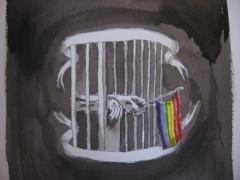The Prisoner Correspondence Project based in Montreal aims to build connections between queers on the inside and queers on the outside through a prison pen pal program and resource library. Xtra.ca spoke to Liam Michaud-O’Grady and Ashley Fortier, two of the collective members of the Project, about the program and their mandate.
The project came together after a group in the US was inundated with requests for pen pals, and organizers saw a need in Canada for a similar group. Queer prisoners are shut out of the mainstream movement, Michaud-O’Grady argues, because there is a tendency to push away from anything that might make queers “look bad.”
This was discussed during a panel titled “Imprisoned Pride” held by the group in August during Montreal’s alternative Pride festivities. The panel argued that queer liberation used to have a lot more to do with prisons and prisoner solidarity — and Michaud-O’Grady says this isn’t really on people’s radar anymore.
“Throughout the ’80s and ’90s ACT UP had this radical presence but also did amazing HIV organizing with queer people in prison,” he says. “So a lot of us in the project situate the project in a desire to continue that dialogue and to make sure that kind of activism is still a part of our movement.”
Things that queers on the outside typically take for granted (for example, free condoms at every bar in the Village), those on the inside of prisons lack completely. So Fortier says part of the goal of the resource library is to explain “how to survive when you’re refused access to the tools that make it possible to survive,” such as condoms and clean needles.
For Fortier, connecting queers on the inside and those on the outside is about building community. She says the project aims “to connect [pen pals] for the kind of basic emotional support and basic communication, while actually confronting the prison system and medical negligence.”
Both Michaud-O’Grady and Fortier consider themselves friends with their penpals. They shared some of the prisoner statements from the Imprisoned Pride panel:
“On Pride: ‘Pride, being proud of who I am inside and outside of my body; I love who I am and what I am which is a transgender male to female, Pride in what I can do to help others who are LGBTQ people that are on the outside of these fences and walls.”
“On Pride in prisons: I’ve been incarcerated almost nine years and the discrimination I have experienced on the streets toward my “gay Pride” is purely based on the politics of church and state… but the discrimination that I experience while incarcerated is so full of venom, that I truthfully believe any normal person would probably kill themselves.”
It is stories like these that the project is trying to make people aware of, and the prison system as it exists does not make that easy. Fortier tells a story of how her own pen pal did not receive much of the material sent to her.
“I think she maybe got flagged as someone who maybe had received too much politicized material or whatever and she just stopped receiving it,” says Fortier. “She was having trouble getting a lot of her mail and they don’t even always tell you if they’ve censored something. So you have to keep writing and make sure that person doesn’t think you’ve stopped writing to them.”
Michaud-O’Grady has similar stories. He sent a pen pal a zine, but it was never received, nor did his penpal receive any notice of seizure, which is normally customary in such instances.
“We operate under the assumption that things like this could get seized,” he says. “Queer sex is this hugely political thing in this context when people are not only refused access to it, but when that refusal of access becomes a form of punishment and rehabilitation.”
“This process of incarceration and punishment operates at the same time as a system of… sexual control and sexual isolation,” Michaud-O’Grady says. “So it’s not just about how ‘oh some queer people happen to be in prison and we happen to be supporting them because we’re queer too.’ It’s like an understanding that the queer prisoner experience is… a particular form of marginalization.”
And one that should not be forgotten.

 Why you can trust Xtra
Why you can trust Xtra


